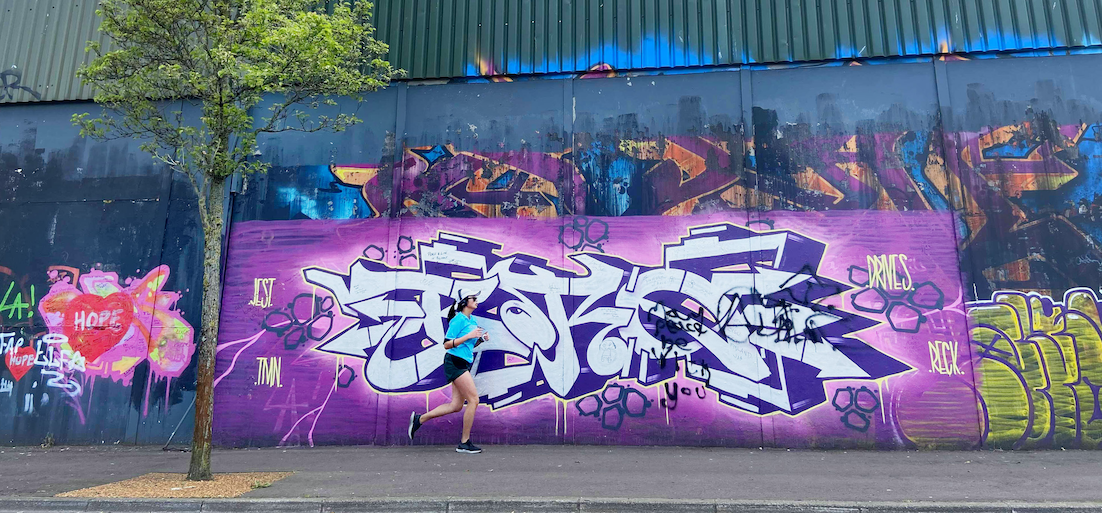
TAKING IT TO THE STREETS: A jogger running in shadow of the peace line during the lockdown. Our photographer Thomas McMullan's pictures have captured the pandemic in images.
Unlike many businesses, local newspapers serving communities rocked by the pandemic didn’t have the option of shuttering operations during the lockdown – because they wanted to keep publishing to bolster the community during the emergency. The Belfast Media Group is proud to be among those publishers.
In many countries and regions, the media is viewed as an essential community service during the crisis. And that is certainly how local newspapers across Ireland see themselves with the vast majority opting to stay open and take an economic hit so that they could serve the public at this trying time rather than save money by putting their titles into a state of suspended animation.
Those involved in the local press believe that at the heart of every strong community is a strong newspaper. When the community comes under attack, as is happening with the coronavirus, the onus is on the newspaper to come to the aid of the community. The quality of reporting, the images captured by photographers, the platform for diverse voices, the dissemination of vital information have all been roles which newspapers have risen to during the pandemic.
At a time when fake news is a menace to the wellbeing of society, when fakirs and frauds can use the purveyors of fake news such as Facebook to peddle falsehoods, the role of trusted local media is more important than ever. Facebook’s only raison d’etre is to flog ads, local newspapers which have served their communities through thick and thin, and in some cases for well over a century, depend on advertising to survive but that is not why they are in business. They are in business to build up the communities they serve.
Newspapers, according to all surveying of the public, are the most-trusted medium. During the crisis, those who are most at risk from the coronavirus (the elderly) are also those who rely most on local print newspapers for their information.
FULLY INFORMED
Increasingly, local newspapers here have created formidable online operations and during the pandemic we have seen how most have enhanced their ePapers and internet news service to ensure that the public is kept fully informed. And, of course, at a time when calm and prudence is essential, local newspapers operate not only out of an abundance of caution towards the wellbeing of their readers but also under strict libel laws and their own publishing protocols which don’t allow the type of invective, vitriol, abuse and scaremongering which is the meat and potatoes of Facebook, Twitter etc.
Many local newspapers have stepped into the gulf left by the restrictions on wakes and funerals to expand their obituary sections to ensure that those who pass away and are denied the obsequies so crucial to our society are ‘waked’ in the newspapers with accounts of their lives and tributes from community leaders and loved ones.
In any democracy, newspapers play a key part in holding government, local, regional and national to account, providing a forum for local elected representatives and citizens alike to air their views on the challenges that face us. Local newspapers are fulfilling that role admirably – for example, Belfastmedia.com has taken on a new columnist, clinical epidemiologist Dr Michael Connolly, published the columns of Prof Mike Tomlinson and has covered every Health Committee meeting at Stormont since the crisis started.
In Scotland, on 19 May, the government put £3m into an public information advertising campaign.
Boris Johnson’s government put £29m into a similar regional advertising campaign but this went mainly into the dailies across Britain as well as the regionals there. What reached the North was paltry. Additionally, the information published in this campaign was geared towards British audiences and the medical advice based on NHS England rather than Department of Health here. .
SCOTTISH LEAD
Following the Scottish lead would entail a public information campaign spend of around £1m. If this was spread fairly among the dailies and the locals, it would make a real difference while ensuring the Executive’s messaging is delivered coherently into the very heart of communites over a ten-week period. There is huge confusion in the community around the Coronavirus guidelines because so many people rely on the BBC from London for their information. This would ensure accurate local information reaches local people.
Thanks @EdinReporter for using my actual words to rebut the lie from @DanMcC1990. I was very clear that @ScotGov wants to & is supporting newspapers but that the Tory proposal would be detrimental to smaller local papers compared to what had already been agreed. https://t.co/DeayiuPwHg
— Michael Russell (@Feorlean) May 21, 2020
There are many substantial publications with huge reach, strong internet presence and a reputation for excellent journalism including the stand-alone titles Tyrone Courier, Coleraine Chronicle, Ulster Gazette, Impartial Reporter, Ulster/Fermanagh Herald, Andersonstown News, Derry Journal, Down Recorder. Some local newspapers did halt publication when the lockdown started, I'm glad to see them return this week.
We are all In This Together and at a time when the Executive is mulling its options re support for the newspaper sector — and when demands are flooding in from many other deserving groups — it's my hope that the will find the way to come up with a support package which ensures the presses keep rolling.
Máirtín Ó Muilleoir is managing director of the Belfast Media Group



